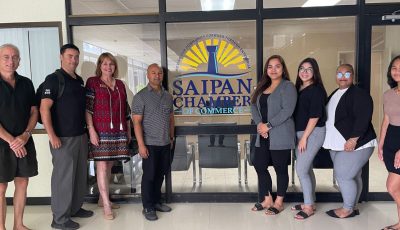NMC opposes paying $78K employer contributions
The Northern Marianas College has filed in federal court its opposition to the NMI Settlement Fund Trustee’s request to compel it to comply with the settlement agreement in Betty Johnson’s class action by paying employer contributions and penalties in the amount of $75,080.79.
NMC legal counsel Mark A. Scoggins said trustee Joyce C. H. Tang argues that the settlement agreement “does not say that the NMC gets to pay a lower rate or that it should not follow Superior Court Associate Judge Kenneth L. Govendo’s order.”
In NMC’s opposition filed in the U.S. District Court for the NMI on Thursday, Scoggins said it is true that the agreement contains no such language, but it does state that the autonomous agencies “shall make supplemental payments…at the same contribution rates they were paying as of June 26, 2013.”
“If the effect of this language is that NMC pays somewhat slightly less than other agencies, then so be it,” Scoggins pointed out.
The lawyer also cited that Tang argues that “if the court were to follow NMC’s interpretation of Section 5 of the settlement agreement, then a party that contributed 0 percent on June 26, 2013, would not be required to pay any employer contributions for its employees.”
“NMC responds that yes, this would be a correct result, but the trustee identifies no absurdity here,” Scoggins said.
Such a result, Scoggins said, would simply mean that the small army of attorneys who put the settlement agreement together took a look at this hypothetical “Agency Zero,” and concluded that zero was sufficient for that particular agency given its situation.
Finally, he said, Tang argues that the result would “…be completely unfair to the agencies which comply, and the retirees who are forced to subsidize NMC.”
Scoggins said NMC fails to understand exactly how the retirees would be subsidizing anything, and the argument is more than a little hyperbolic.
To say also that the situation is “completely unfair” to other agencies presumes many facts and circumstances that might demonstrate that NMC is, in fact, similarly situated to every other agency, he said.
“The court need not consider such things, however, because the plain language and the four corners of the document lead to only one conclusion; NMC is not in default, and the trustee’s motion should be denied,” Scoggins said.
He said NMC received no procedural or substantive due process in the Superior Court, and that it remains a mystery to NMC as to how it ever could have been ordered to do something in a court case to which it was never a party.
The trustee, through counsel Dean Manglona, asked the court to require NMC to pay all future employer contributions at a rate of 30 percent.
Manglona asserted that other CNMI agencies choose to cooperate and work with the Settlement Fund to find the funds to make the full 30 percent contribution from their budget.
“NMC has no excuse for not making the full 30 percent employer contribution for its employees,” the lawyer said.
To allow NMC to pay a lower rate would not only lead to an absurd result, Manglona said, but it will also be completely unfair to the agencies that comply.
In her declaration in support of a motion to enforce final judgment, Tang said the settlement agreement in Johnson’s case requires the NMI government and autonomous agencies to pay employer contributions to the Settlement Fund after each pay period at the rate of 30 percent of total payroll, pursuant to Govendo’s order on Aug.
11, 2011.
Tang said as of pay period ending Feb. 21, 2015, the CNMI government and all other governmental entities, except for NMC, has been paying their employer contributions based on the reduced 30 percent rate. Tang said NMC currently pays employer contributions at the low and incorrect rate of 20 percent.



























